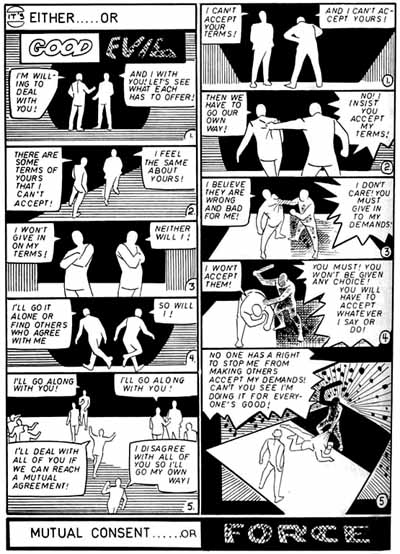
|
George W. Bush, the joke went, promised in 2000 to be a uniter, not a divider, and he succeeded — he united the Democrats. And not just the Democrats. All sorts of different people came together in 2004 to vote Bush out of office. They failed. It has been interesting this past week to see this coalition come flying apart.
I didn't. Some did. There's a faction of the Kerry coalition that looked at the red states on the election map and said that we'll never win unless we start appealing to these people in here. Who do they like? God-fearing conservatives who look and sound like them? Fine. We have some of those. We'll start by naming as our Senate leader a devout Mormon whose biographical web page at senate.gov features testimonials from Orrin Hatch and Trent Lott, but no Democrats. See if we can't tap Mike Easley and Evan Bayh for the '08 ticket. Tack right on a bunch of issues and we'll be fine. Then there are those who looked at the red states on the election map and finally realized, "That is not my country."
When I went searching online for a specific citation of Bush saying that Saddam Hussein gassed "his own people," this instance from June 17th was hardly my only choice. Bush is famous for saying the same thing over and over and over again and this is no exception. Bush is also famous for saying things that aren't true, and again, this is no exception. Saddam Hussein did not gas his own people. Saddam Hussein's people are Sunni Arabs. The people he gassed in Halabja in 1988 were Kurds. Members of both of these populations happen to have wound up within the borders of the artificial nation-state of Iraq. But the British did not, by drawing lines on a map, magically turn the Arabs and Kurds into countrymen. I don't hate Bush voters. But they are not my countrymen.
Since the election, a lot of distraught progressives have been daydreaming about moving to Canada or, even better, seceding from the US. But while the US has a well-established process for adding states, there's no provision for states leaving — launching the process would assuredly lead to war. And to think... the culture we'd like to divorce ourselves from and which would now never let us leave? It was once willing to go quietly. Pardon me while I slap my forehead. So, yeah, secession's not going to happen. But there might be some other things we can do to either, as a longshot, take back control, or more realistically, win some of the rewards of secession. American institutions such as the Senate and the electoral college are based on the idea that the US is a federation of distinct states. That North Dakota and South Dakota are such very different societies that they need separate representation in the upper house of the federal legislature, but California is a unified whole from Alturas to San Francisco to Coto de Caza. This is of course ridiculous. Most state boundaries are arbitrary. France's borders are where they are because that's where the French people live; Wyoming's borders are where they are because some cartographer in DC liked rectangles.
In fact, by redrawing state lines, you can generate any outcome you want, from a 521-17 Kerry landslide to a 538-0 Bush shutout. And the lines you draw would be no more arbitrary than the lines that currently exist. It is highly unlikely that state lines will ever be redrawn, at least in my lifetime. But there's another way to game the system that is entirely practicable. During the 2004 campaign, I often encountered Kerry backers saying, "My vote doesn't count — I live in Massachusetts" or "My vote doesn't count — I live in Texas." Some toyed with the idea of moving to swing states, at least in jest. And students were strongly encouraged to register in swing states if they had a choice: if you're from Florida but are going to school in New York, they were told, register in Florida. This would be one way to go, I suppose. Kerry won California by a million votes. If 15% of those unnecessary Kerry voters had moved to Ohio over the summer, Kerry would be president. But here's the thing. We don't even have to swing any states from one column to another for our guy to win. Electoral votes are reassigned every ten years on the basis of population. States get an electoral vote for each member of Congress they have, and DC gets three. So let's take those two Kerry voters mentioned earlier. The first one's actual vote doesn't count for much — Kerry winning Massachusetts was a foregone conclusion. But she helped him simply by living in Massachusetts at the time of the census and swelling its electoral vote count. The second one's actual vote also doesn't count for much — Bush was sure to win Texas. But this guy actually hurt his candidate, simply by living in Texas and swelling the electoral vote count for Bush. The moral of the story is simple. If you're a liberal living in a red state, LEAVE. You don't have to go to a swing state. Going to a blue state is fine. Here is what would have happened had all of the Kerry households in red states moved to blue states before the last census. Not one state changes hands, and I'll err on the side of keeping votes in the red states. Still, look at Bush's new electoral vote count:
Kerry wins, 331-207, without a vote changing hands or a line being redrawn. Of course, Bush won the popular vote, so even if all of Kerry's voters were to leave the red states, Bush could retake the electoral college simply by having his voters leave the blue states. We'd then have states with completely lopsided tallies. And that would be awesome. They say the US has become polarized. (The numbers seem to back this up — go to uselectionatlas.org and you'll find that each state's county-by-county map lets you roll between the 2000 and 2004 returns. Almost invariably, the colors get darker.) Now there's been talk of healing the divisions in the wake of the election. Enh. I don't want to "bring our polarized country together." Polarization is good for me. I'm at one of the poles.
I am on the Barack Obama bandwagon to the extent that his record is reasonably progressive, he's not from the south (he's actually from Hawaii, of all places), and he looks like he actually has a pretty good shot at being president someday despite this. But, at least here, he could not be speaking for me less. I don't worship an awesome god. I don't pledge allegiance to the stars and stripes. And I don't defend the United States of America. It's easy to see why Obama took this tack. Every election, the Republicans try to argue that Democratic candidates represent a culture far from the American mainstream, that they're unpatriotic, anti-military, anti-Christianity, anti-gun socialists with snobbish tastes. The Democrats counter, as Obama did, that no, they're right there in the mainstream: "I love this country as much as you do! I actually served in the armed forces myself! I'm as devout a Christian as anyone — Christianity is at the root of all my ideals! I go hunting every fall, want to cut your taxes, and I like football and Nascar and Cheez Whiz!" There's only one America, we're all part of the same culture, so let's talk minor policy distinctions. Except, again, the whole point of the federal system is that states are supposed to have different cultures. Nevada is not supposed to be like Utah. Massachusetts is not supposed to be like New Hampshire. I want to see these distinctions grow sharper. Why? Because the more state cultures diverge, the more likely it is that you'll be able to find one that suits you — even if, like me, you actually are the unpatriotic, anti-military, anti-Christianity, anti-gun socialist with snobbish tastes the Republicans use as a bogeyman. Because, as noted at the top, not only are the left and right miles apart, but even the left is not uniform. I randomly came across a blog entry relishing the idea of red and blue America going their separate ways — but the author's country isn't one I'd want to live in any more than I want to live in Bush's. He writes, "New York City is a good model; Berkeley is not." I've lived in both those places. Moving back to Berkeley is pretty much my primary goal in life; New York City made me want to kill myself. But hey! That's why we have multiple blue states! So that this guy and I don't have to live with the fundies or with each other!
#1: The reason this works is the remarkable geographical contiguity of the states in each camp (at least when you throw Canada into the mix). This year we didn't have islands like 2000's red New Hampshire and blue New Mexico. The split within America is not just demographic; it's truly regional. Which makes secession much easier to imagine. This graphic wouldn't work as a checkerboard map.
The armies of the Believers faction in Alpha Centauri get a +25% bonus on their attacks due to their religious fervor. They also get a -2 penalty on research. Miriam's faction doesn't want to learn things. Neither does Bush's. And neither does Bush. It's not just that he proudly proclaims that he doesn't read newspapers, trumpets his bad grades at Yale to prove he wasn't tainted by higher education, mocks people for speaking foreign languages or using words outside his active vocabulary, and is regularly described even by his most ardent supporters as "incurious". It's his sheer hostility to unsolicited input. Even questions from reporters are invariably greeted by Bush with defensive whining; while John Kerry's town hall meetings during the campaign were come one come all, Bush's audiences had to sign loyalty oaths to get in. And then there's his approach to foreign affairs, in which the US says, "This is what we're doing; you can help if you want," and if other countries try to chime in with an opinion, the response is effectively, "Shut up — fuck you — we don't care what you think." This attitude was vividly on display in the response from the "American heartland" to a British newspaper's initiative to send letters arguing in favor of John Kerry. Some of the replies:
In short: "Shut up! Fuck you! We don't care what you think!" And note that these responses were not to the actual letters, but to the very idea of considering someone else's opinions. Part of this hostility seems to stem from a massive inferiority complex. Time and time again I've heard southern and midwestern voters say that the number one thing they're looking for in a candidate is someone who doesn't "condescend" to them — and, it seems, all attempts to communicate by anyone who isn't one of them will be interpreted as condescension. Howard Dean encountered this in one of those big nine-way debates back in 2003. He'd said, "I want to go down to the south and talk to people who don't make any more than anybody else up north but keep voting Republican against their own economic interests," and John Edwards replied, "Let me tell you, the last thing we need in the South is somebody like you coming down and telling us what we need to do." Shut up! Fuck you! We don't care what you think! Now, I don't think for a minute that this is what John Edwards actually thought. But he knew this response would win big points for him in the south, where people could be counted on to object, not to Howard Dean's ideas, but to his audacity in even opening his mouth. They call it "lecturing." They accused Kerry of doing it during the debates: Bush talked, Kerry "lectured." Now, me, I like lectures. One thing I loved about UC Berkeley was that classes were taught lecture-style, with an informed speaker holding forth on a subject in an organized manner to a packed auditorium instead of the chit-chat-style classes I was used to in high school. But that's me. I went to those lectures because I wanted to learn things. But as Missouri-reared Jane Smiley has pointed out, Red America actively values ignorance:
After the debates were over and it was clear that not even the "Bush communicated, Kerry lectured" mantra was taking hold, the Republican spin machine took a different angle: "We're not electing a debater!" they cried. That is to say, they came out and admitted that, yeah, if you actually want to argue over the direction the country should take, then sure, Kerry's going to come out ahead. But Real Americans don't vote based on "arguments." I mean, what are you supposed to do if you're proven wrong in an "argument"? Change your mind? One of the key contrasts in the 2004 election was that between a guy who changes his mind and a guy who doesn't. Democrats were frustrated because their guy seemed to be on the losing end of this comparison. Kerry, they complained, actually examined the facts of an issue and changed his mind when the facts changed, and for this he was tagged a "flip-flopper"; Bush stubbornly stuck to wrong decisions even as things got worse and worse, and for this he was heralded as having "conviction." How could Democrats reframe this issue?
When this quote appeared in the New York Times Magazine, left-wing bloggers seized upon it as a crucial slip from the Bush camp. They've handed us the key to finally explaining to the general public in simple terms what Bush's problem is! He's out of touch with reality! That's the winning angle! I mean, who's anti-reality? So, tacking slogans like "Proud Member of the Reality-Based Community" to their mastheads, they did their best to spread the meme... ignoring the fact that this guy had coined the phrase as a pejorative. Bush's people were betting that in fact the majority of voters were the sort who'd take "reality-based" as a smear. And they were right:
So there you have it. The World that exists outside one's mythology — reality — is, explicity, the enemy. It explains so much. All the pundits were so sure that Kerry was finally on the right track when he started accusing Bush of living in a fantasy world. Little did they know that Bush had 59 million voters in there with him. Some did, though. One person who warned about the evangelical vote ahead of time was one of my favorite writers, who also happens to be a minister affiliated with a black church in Colorado Springs. A few days before the election, he noted:
My immediate reply was, "If you're on the other side of an issue from a particular group, how much sense does it make to talk about that issue more loudly?" Others chimed in to say, yeah, if they actually are religious conservatives, why should they vote for the Democrats? Don't they fall squarely in the middle of the Republicans' natural constituency? The answer, as Al Sharpton pointed out at the convention in reply to Bush asking the same question the previous week, is that in addition to being religious conservatives, blacks also tend to be (a) poor and (b) discriminated against, and the Democratic Party is the one that fights for those two groups. This argument jibes with the conventional wisdom that, as Howard Dean recommended, the Democrats should reach out to poor social conservatives of all races and show them that the Republicans have been using "God, guns and gays" to trick them into voting against their own economic interests. Because economically, as books like What's the Matter with Kansas? have pointed out, things have turned upside-down recently. Here's one side of the equation:
And on the flip side we have this:
This is the new debate, it seems: "What's wrong with you? We're just trying to help you!" "We don't want your help! All we need is JESUS!" And a lot of people are fed up. So the red staters want to dismantle the welfare state? Fine. We tried, but no skin off our noses — they're the ones who are benefiting from it:
 One of the best proposals I've heard over the past week is this: so the Republicans are vehemently opposed to redistribution of wealth? The income tax, the inheritance tax, the welfare system? Great! Then let's end this interstate welfare. From now on states only get back from the federal government what they put in. We'll still take care of the poor — in Massachusetts, and Vermont, and California. The poor in Alabama and West Virginia and Idaho will be screwed, but they won't mind — they'll still have Jesus. Of course, my instinctive reply to this is to make excuses. These people didn't ask to be brought up as terrified fundamentalists; they didn't ask to go to crappy schools that didn't teach them how to think through the issues; they can't be held responsible for having become who they are. But I guess that's more of that "liberal condescension," right? All right, then. Fuck 'em. Because, y'know what? So cultural issues are more important to the red-staters than economic issues or foreign policy matters? Same here. Let's go back to Priest's article. The first time I read it, I thought he was suggesting, as many pundits are doing now, that the Democrats punt on social issues: give up on Roe, tell gay people to go back into the closet for another thirty years or so, and spend the next while explaining how their economic and foreign policy positions are actually all of a piece with the Christian values we all cherish. Then I had a closer look and decided that, nah, he just meant that, as other columnists argue, the Democratic Party can keep its positions on social issues, but it has to couch its discussion of those issues in Biblical terms. Clinton was great at that! This kind of talk makes my skin crawl. These people are basically pushing for some moderate clerics to go up against the Republicans' hardline ones. They want me to vote for Mohammed Khatami to keep Ali Khamenei from ruling without restraint. But I would rather not live in an American version of Iran at all. It's hard for me to get fired up about the idea of using Christianity to achieve my goals when one of my main goals is averting theocracy. I say "one of" because I hate both wings of the Republican Party — the born-again wing and the corporate wing. The America of today, as described here by a former professor of mine, is scarcely better than the Christian Iran I'm afraid of:
Compared to this, it is easy to see why there's a faction of the left that wants to start framing things along these lines: "We all have the same ideal for America: a land of simple people united by hard work and faith in God. We believe God loves all His children equally and wants us to protect His green earth..." I mean, can't you hear that speech being delivered at the 2008 Democratic convention already? But that too could hardly be farther from my ideal America. Nor am I looking for a hedonistic party state. I want to live in a land of great natural and architectural beauty, among enlightened, highly educated people without sexual hangups, who work as little as possible while still meeting society's needs, and spend the rest of the time enjoying and creating art and music and literature and stuff. I want civilization.
Christopher Hitchens has been arguing for a couple of years now that the left is way off base in opposing Bush's wars. Bush hasn't been targeting people like Salvador Allende, the way Kissinger did; he's been taking on regimes that leftists in particular should despise. The Taliban's "Department of Vice and Virtue" is the sort of thing that haunts liberals' nightmares but which the Bush faithful in Provo and Greenville were probably sorry to see go. He has a point. I despise the Taliban. This election worried those of us who voted for Kerry because it looks like the US is turning into A Mind Forever Voyaging circa 2041 — but the Taliban were running a country out of 2071. My first glimpse of the Taliban came in 1996: they were in construction vehicles gleefully smashing statues they'd gathered depicting women. Things got worse from there. And this was hardly an anomaly in the region. Saudi Arabia and Iran are little better. I agree with Hitchens that those who let their opposition to American imperialism morph into support for fundamentalist Islam have lost all perspective. I disagree with Hitchens's contention that the Bush Administration's wars are a heroic defense of civilization. The war between the Christian States of America and fundamentalist Islam is a clash of Ares-worshippers. Jesusland isn't fighting for Enlightenment principles — it's in a contest to see, as Lt. Gen. William Boykin put it, whose god is bigger. (I think just typing those last four words has made me stupider. Gyah. Never thought I'd be nostalgic for the Cold War. At least that was about something sensible.) This past election was like 2002 redux. It wasn't just Bush vs. Kerry — what really set off my "aw, shit" trigger on Election Day was the news that Tom Coburn — Coburn who advocated the death penalty for abortionists (despite being one himself), Coburn who attacked Schindler's List for its depiction of "irresponsible sexual activity," Coburn who warned of a wave of teenage lesbianism in public schools — had won a Senate seat, and by a wide margin. Republicans have gone from narrowly holding all three branches of government to dominating all three. The left seems to have as much chance of retaking the government as the Kurds had in Iraq.
I was looking at a site about Athena earlier, and one page of the site is devoted to paintings of Athena in various attitudes. Part of the list goes like this: "Athena, patron of cultural war; Athena victorious over ignorance; Athena protecting peace; Athena protecting art and science." And I thought, y'know, yeah — that's what it's all about. If that's Athena, then Athena represents me. And by a happy coincidence, Athena is not just the goddess of civilization, but the adopted goddess of my homeland. She's right there on the state seal, looking out over the San Francisco Bay — and ready to defend it with shield and spear. So. What is to be done? I've read all sorts of suggestions, all sorts of plans. I've hinted at some of my own. But even if someone were to come up with a perfect strategy for wresting power from the corporate and religious right, how could we get the message out? As Tom Tomorrow points out:
I had similar thoughts on election night. It seems to me that there are basically six places to reach people to get the progressive message out:
Let's take these one at a time. Home: Nothing affects who you'll become more than the way you're brought up. One of the disadvantages progressives face is that there's no better birth control than being rich and well-educated, unless it's actually being concerned about overpopulation in a world full of creeds that demand their followers multiply as fast as they can. In short, we're being outbred. (I can't wait to see what happens in Jesusland when the Mormons and the born-agains have equal shares of the population. The CSA may just eat itself.) School: This is one area where the left has done quite well establishing itself. Unfortunately, we've done so mainly at the university level. And while it's great to be able to send eighteen-year-old undergrads back home for Thanksgiving as new and better people, there are still all too many second-graders serving as a captive audience to teachers as ignorant as a New York Post columnist. As Laura Kipnis points out above, there is an active effort underway to make schools into factories cranking out unquestioning subjects — even moreso than they already are. If we're going to start fighting back, the presidential level may be less important than at the level of the classroom and the school board. Work: This was the chief battleground back in the industrial age, but now we live in a society in which labor no longer thinks of itself as labor. This is the insidious part of Bush's "ownership society" — the goal is to make workers think of themselves as capitalists waiting to happen and support policies which screw them now but will help them once they're fabulously wealthy. Truck drivers making less than $20,000 a year call in to right-wing talk shows and complain about a "death tax" whose abolition benefits the Paris Hiltons of the world. Back in the day they called this "false consciousness." It's been one of the biggest blows to the progressive movement in America. Friends and family: I've read quite a few testimonials over the past few days from people saying things like, "I was a diehard social conservative myself for years... but then my best friends came out, and I couldn't summon the hate anymore..." and "I was a libertarian once, thought the government should absolutely keep its nose out of business... then my mom lost her entire savings in the Enron collapse..." I will concede that one drawback of polarization is that it makes it less likely that bigots will question their attitudes after being exposed to people who aren't like them. But all the apartheid in the world can't keep some doors from being thrown open. Ask Dick Cheney. Church: One moment that gave me a sinking feeling shortly before the election results started to trickle in came when I was listening to NPR and heard someone from the Christian Coalition or some such group mention that his people had distributed THIRTY MILLION voter guides to parishoners. THIRTY MILLION! It put in perspective all the pats on the back bloggers were giving themselves for the virtual communities they'd constructed. How can you beat church? When the institution that serves as the primary source of self-definition for millions is also an effective vehicle for communicating messages, whoever's at the microphone wields enormous power. They say that in the red states there's a church on every corner, and that the blue states are the same, only with Thai restaurants. If we could only get tens of millions of people to go to a Thai restaurant on a weekly basis and carefully consider what the waiter has to say about the issues of the day, we might be able to achieve parity. Media: Jon Stewart recently theorized that the election results were the red states' revenge for blue state dominance of the airwaves: "We don't really care for this Will & Grace thing, and here's what we're going to do about it." There might be something to this. There's a Mark Twain story called "The Esquimau Maiden's Romance" in which the maiden of the title imagines that the wealthy industrialists of the east coast live in fabulous igloos with vaults full of fishhooks and two slop-tubs in the parlor. It's easy to fall into the trap of assuming that what you don't see is similar to what you do. So before the advent of television, maybe it was easier for people in Muskogee and Arkadelphia to imagine that their lives weren't much different from those of people in New York City. But now they can see that none of these sitcom people seem to go to church or care about Jesus or value chastity and it just seems like they're from a different country and it's one that I don't like and they're looking down on me and shut up! Fuck them! I don't care what they think! So you can make that case. But you can also make the opposite case and reach the same result: that thanks to the manifold expansion of the media, you can find a whole range of news and entertainment on the radio and TV and the various internets Bush talked about in the debates, and select the stuff targeted to your political and cultural persuasion. Watching "The Daily Show," listening to NPR, and reading the big liberal blogs, I'm living in Massachusetts in mind as well as in body — and getting a much different sense of the world from someone living in Amarillo, watching Fox News, listening to Rush Limbaugh and reading Freerepublic. Thanks to the fragmentation of the media, we each get a radically different sense of what's "mainstream." We're all standing in different streams, thinking it's the main one. If this is true, and the "mass media" is a thing of the past, if any given voice within it is now only reaching a sliver of the population instead of the fat slices of the mid-/late 20th century, then the media becomes just another bottom-up institution like the ones above. This can be frustrating. Over the past week I've been poking around the net and encountering observations about the election and recommendations about where to go from here that have made me think, "Everyone needs to see this!" — while knowing full well that only a handful of people ever will. Turning our online natterings into an actual movement seems like a hopeless task. But on the other hand... even this article here on my obscure corner of the web will reach more people than fit into an average church. Reaching people in small clusters doesn't seem to have worked out so badly for the right wing. (Of course, it probably didn't take them a fricking week and a half to get their thoughts together, either...)
Return to the Calendar page! |





